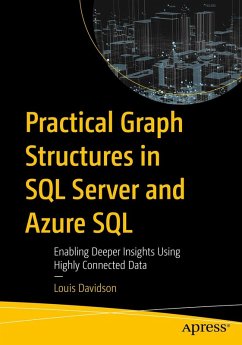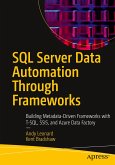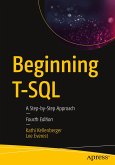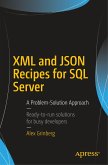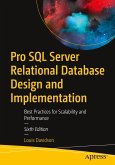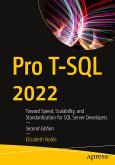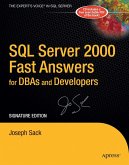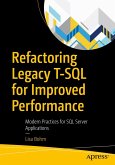Use the graph table features in Azure SQL that were introduced in SQL Server 2017 and further refined in SQL Server 2019. This book shows you how to create data structures to capture complex connections between items in your data. These connections will help you analyze and draw insights from connections in your data that go beyond classic relationships.
The graph examples in the book are useful for analyzing social media relationships, complex product-to-customer relationships, and any other type of data analysis in which indirect connections that otherwise might be missed using conventional techniques can be mined for their insight and business value.
Tree structures are covered, with emphasis on a structure commonly used by organizations to aggregate data at different levels of an organization. The book provides code examples of SQL Graph objects as well as an alternate tree implementation technique. Included is sample data (and data generators)for you to test for performance and choose the implementation approach that best suits your needs and that of your application.
If your job involves analyzing or storage of data elements that are connected in a networked topology, then this is the book that will help you bring the power of SQL Server to bear on that data and take advantage of your existing knowledge.
What You Will LearnUnderstand the graph model and the associated terms used in graph analysis
Store highly connected data in SQL Server and Azure SQL alongside existing relational dataMake full use of the graph table feature that is refined and enhanced in SQL Server 2019Implement high performance tree structures that will make storing and querying tree data possibleReport on data associated with a tree structure to aggregate results at different levels
Who This Book Is For
The graph examples in the book are useful for analyzing social media relationships, complex product-to-customer relationships, and any other type of data analysis in which indirect connections that otherwise might be missed using conventional techniques can be mined for their insight and business value.
Tree structures are covered, with emphasis on a structure commonly used by organizations to aggregate data at different levels of an organization. The book provides code examples of SQL Graph objects as well as an alternate tree implementation technique. Included is sample data (and data generators)for you to test for performance and choose the implementation approach that best suits your needs and that of your application.
If your job involves analyzing or storage of data elements that are connected in a networked topology, then this is the book that will help you bring the power of SQL Server to bear on that data and take advantage of your existing knowledge.
What You Will LearnUnderstand the graph model and the associated terms used in graph analysis
Store highly connected data in SQL Server and Azure SQL alongside existing relational dataMake full use of the graph table feature that is refined and enhanced in SQL Server 2019Implement high performance tree structures that will make storing and querying tree data possibleReport on data associated with a tree structure to aggregate results at different levels
Who This Book Is For

